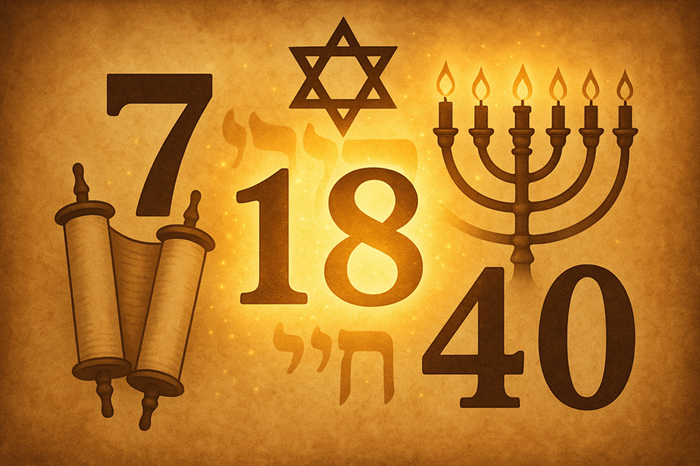Have you ever noticed how some numbers just keep popping up in Jewish stories, holidays, and traditions? Like the number 7 in the seven days of creation, or the number 18 when it’s time to give a gift? Well, those aren’t just coincidences — in Judaism, numbers carry deep symbolic weight. Some are seen as spiritually powerful, others as signs of good fortune, and a few as deeply mystical.
So what makes a number “lucky” in Jewish culture?
A Brief Look at Numerology in Jewish Tradition
Judaism has long held that numbers are more than just practical tools — they’re symbolic. This idea really takes off in Gematria, a form of Jewish numerology where Hebrew letters correspond to numerical values. Through this system, ancient sages explored hidden meanings in Torah passages and sacred texts.
But it goes beyond that. Numbers show up everywhere in Jewish rituals, laws, and stories — often loaded with symbolism or spiritual resonance. Whether it’s the Ten Commandments or the 613 mitzvot (commandments), numbers help frame the Jewish worldview.

Why the Number 7 Is Considered Holy and Complete
If Judaism had an official lucky number, 7 would be a strong contender.
Here’s why:
- Seven days of creation: The world was created in six days, and on the seventh, God rested — giving us the Sabbath.
- Shabbat (the seventh day) is not just a break; it’s a sacred pause, a taste of eternity each week.
- Many Jewish festivals and rituals involve seven: seven blessings at a wedding (Sheva Brachot), seven days of mourning (Shiva), and even seven circuits around the bride and groom under the chuppah.
In short, 7 symbolizes completeness, holiness, and divine order.
The Mystical Significance of 18: Life, Luck, and the Power of “Chai”
Here’s where things get especially interesting. The number 18 is associated with the Hebrew word “Chai” (חי), which means “life.” In Hebrew, the letter chet (ח) is 8 and yud (י) is 10 — together, 18.
This makes 18 a super symbolic number in Jewish tradition, especially when it comes to gifts or donations:
- It’s common to give money in multiples of 18 as a way to say, “I’m giving you a blessing for life.”
- Bar mitzvah gifts? $36. Wedding donations? $180. It’s all about symbolic giving with deeper meaning.
Giving chai is like giving a little luck, a little love, and a little soul all at once.
The Role of 40 in Transformation and Spiritual Cleansing
The number 40 often shows up in moments of major change and transformation in Jewish history. It’s not always “lucky” in the cheerful sense, but it’s powerful.
Let’s look at a few examples:
- 40 days and nights of rain during Noah’s flood — a reset for the world.
- Moses spent 40 days on Mount Sinai receiving the Torah.
- The Israelites wandered the desert for 40 years — a full generation passing before reaching the Promised Land.
- Mikvah (ritual bath) must contain 40 se’ah (a measurement of water) for purification.
So, 40 is like the number of spiritual renewal. It’s about preparation, transformation, and new beginnings — often following hardship or waiting.
Other Noteworthy Lucky Numbers in Hebrew (3, 10, 12, and 613)
While 7, 18, and 40 steal the spotlight, several other numbers carry deep spiritual meaning:
- 3: The Torah was given in the third month (Sivan), and Judaism often emphasizes “three pillars” — Torah, prayer, and acts of kindness.
- 10: Think Ten Commandments or the need for a minyan (10 people) to hold communal prayer.
- 12: Represents the 12 tribes of Israel.
- 613: The total number of commandments in the Torah. Yes, it’s a lot — but each one represents a unique way to connect with the divine.
These numbers act like spiritual signposts, guiding Jewish thought, law, and daily living.
How Gematria Connects Letters and Numbers to Hidden Meanings
If you’ve never heard of Gematria, think of it as the Jewish equivalent of the Da Vinci Code — only older and holier. (Check out our Gematria Calculator)
Each Hebrew letter has a numerical value, so words and phrases can be analyzed mathematically to reveal hidden insights:
- The word for love (“ahava” – אהבה) equals 13. Combine it with another 13, and you get 26 — the same numerical value as God’s name (YHVH – יהוה).
- “Mashiach” (Messiah) and other powerful words are studied and compared through their numeric connections.
For mystics and scholars, Gematria is a way to dig deeper into sacred text and uncover messages you might otherwise miss.
Modern Uses of Lucky Numbers in Jewish Life: From Donations to Birthdays
Even today, Jewish culture is full of these numerical traditions:
- Donations in multiples of 18 are still the go-to gift.
- You’ll find 7s and 18s in wedding rituals, holiday observances, and even business deals.
- Some parents name their children based on numerology, choosing names with numbers that reflect qualities like strength, peace, or wisdom.
So while ancient in origin, these lucky numbers remain very much alive in modern Jewish practice.
More Than Math — The lucky numbers in Jewish religion
From the sacred rhythm of 7 to the life-affirming power of 18, numbers in Judaism aren’t just math — they’re meaning. Each one reflects a layer of spiritual wisdom, a cultural tradition, or a divine connection. Whether you’re reading Torah, attending a wedding, or just writing a check, chances are, one of these “lucky” numbers is hiding in plain sight.
And next time someone gives you $18 as a gift? Don’t think it’s random. It’s a blessing in disguise — literally.

